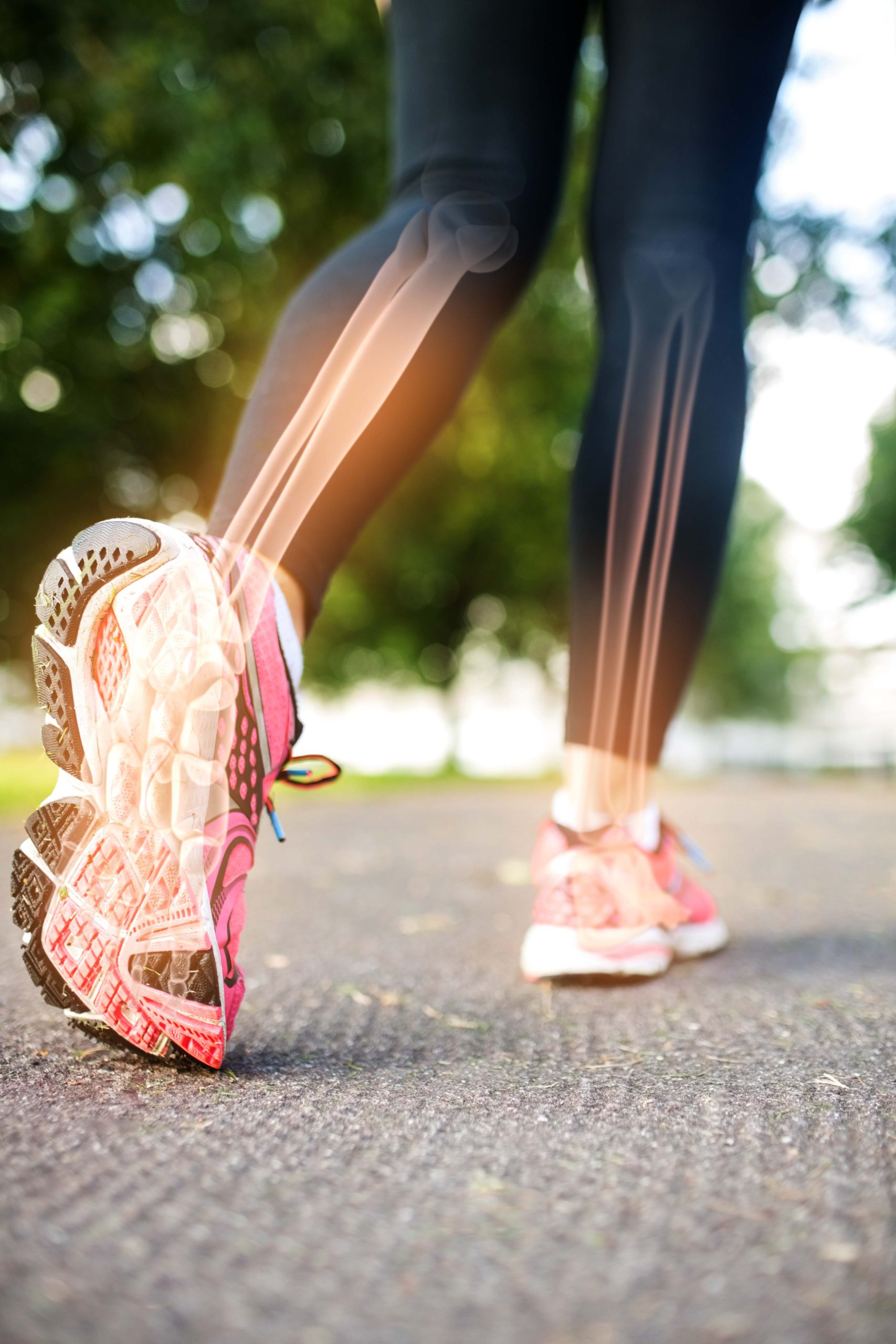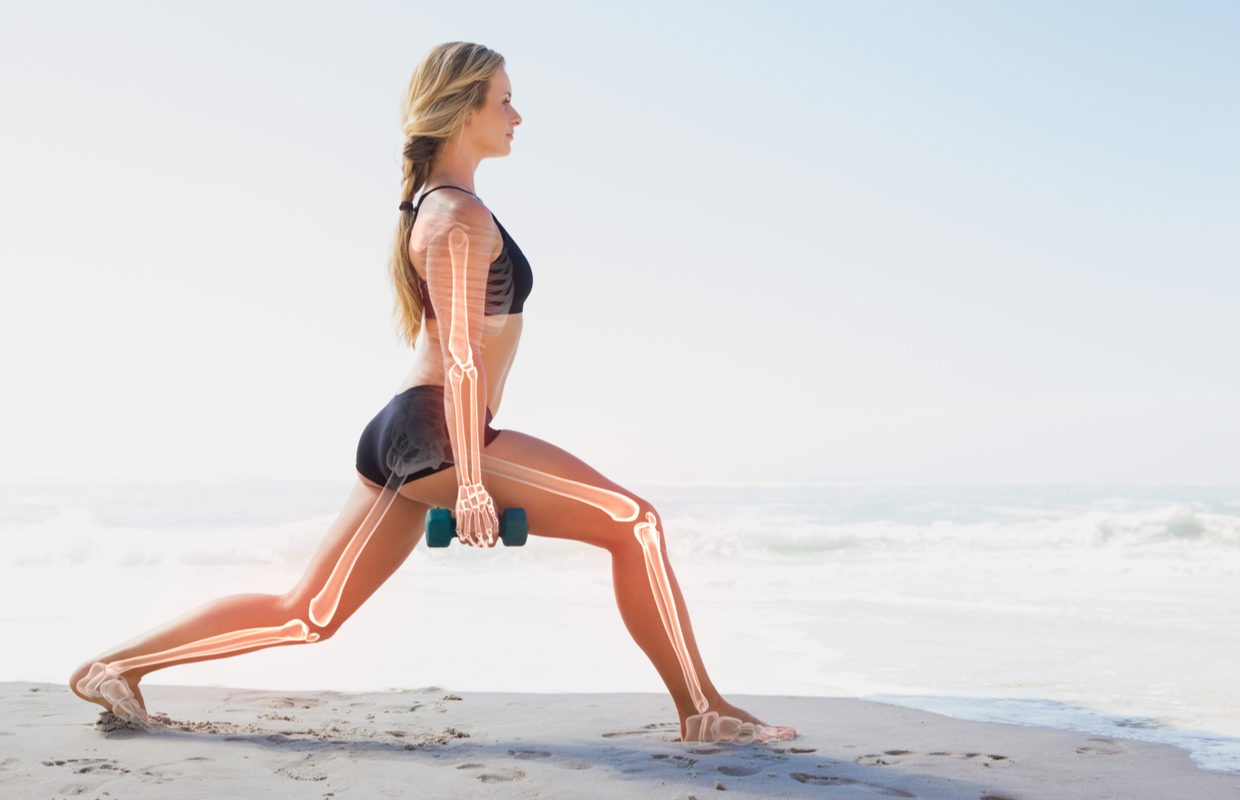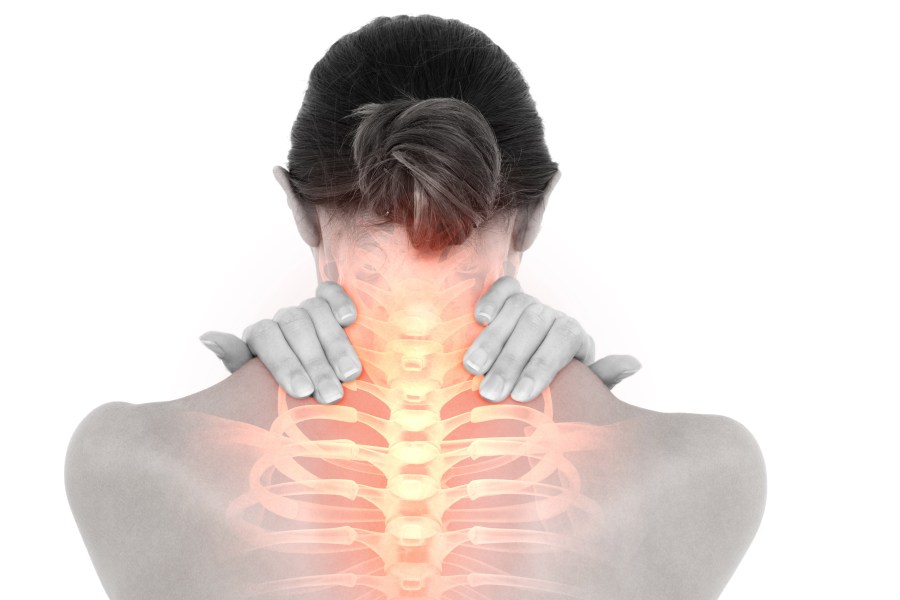If you want strong bones for life, you need to do more than look to your exercise programme. Nutritionist Christine Bailey shares her top nutrition tips to boost your bone health…
When was the last time you overhauled your diet to protect your bones? Healthy bones aren’t a given. Bone is considered to be a living tissue and an endocrine organ that secretes compounds, which function like hormones throughout the body. It is constantly remodelling itself in response to its environment.
This means that the nutrition and lifestyle choices you make, at any age, can have a profound impact on your long-term bone health. Here’s how to ensure you make the best decisions…
What are bones?
So, what actually are bones? Our bones are made of crystals of calcium salts in a protein matrix. A type of cell, called an osteoblast, produces the matrix and attracts calcium compounds to form new bone. A different set of cells, called osteoclasts, reabsorbs the bone tissue to allow new shapes and structures to form.
This remodelling, which is happening all the time, allows any microdamage that may arise during daily activity to be repaired, and for the dead bone to be removed.
For the first half of your life, the new bone is packed on faster than the old bone is disposed of. This means bone density increases. But by age 40, you start disposing of more bone than you add, which means you start to experience a bone loss of around one per cent per year.
Gradually, over time, if you don’t pay attention to your overall bone density, your bones may become weaker or ‘osteopenic’. If bone density drops further, you may develop osteoporosis in which bones are particularly fragile.

Our bones are made of crystals of calcium salts in a protein matrix. Osteoblasts produce the matrix and attract calcium compounds to form new bone.
What is osteoporosis?
Osteoporosis, or porous bones, is a disease that causes bones to become brittle and very susceptible to fractures. People often call it the ‘silent disease’ because there are few warning signs and they’re easy to overlook.
Far from being an older person’s problem, it’s estimated that around three million people in the UK have osteoporosis. Worryingly, few people know they have it until they break a bone. While it used to be considered a condition that just affected menopausal women, osteoporosis can occur at any age and impact both men and women.
It’s also not simply due to falling hormone levels either. Research has highlighted a number of causes, including suboptimal nutrition, lack of weight-bearing exercise, hormone imbalances, inflammation, oxidative stress, high blood sugar levels, use of certain medications, genetics and being underweight.
The good news is that by taking action early on and making the right nutrition choices, you can improve your bone health and keep osteoporosis at bay at any age.

Your bones need over 13 different nutrients to keep them in optimal health, including magnesium and calcium.
How nutrition affects your bone health
Keeping your bones healthy requires much more than simply drinking milk! Your bones need over 13 different nutrients to keep them in optimal health.
Two of the major minerals (meaning we require them in large amounts) are calcium and magnesium, but you also need the trace minerals boron, zinc, selenium, copper, silicon and vanadium, plus the vitamins D, K, E, C and B.
That’s not all! Research has shown that chronic low-grade inflammation continuously activates osteoclasts, the specialised cells that break down bone, but a diet rich in omega-3 fatty acids (EPA and DHA) will defend your bones against osteoporosis by producing specialised compounds called resolvins and protectins. These compounds help to reduce the inflammatory processes affecting your bones.
Other useful anti-inflammatory nutrients from olive oil, turmeric and colostrum have all been shown to further support bone health. Don’t overlook the importance of protein in your diet, either – collagen is the major protein and component in your bones, and you need essential amino acids to produce plenty of collagen.
Which foods provide the best nutrition for bone health?
One of the best types of diets studied for bone health benefits is the Mediterranean diet. The traditional Med style of eating includes a variety of foods, including olive oil, oily fish, colourful fruits, berries, herbs, spices, leafy greens, nuts, seeds, beans and pulses. These are all fabulous foods for keeping inflammation at bay and providing the building blocks for healthy bones.
If you have already been diagnosed with low bone density, the good news is that you can make a difference. Bones are like muscles – with the right environment and exercise, you can improve their health and strength.
This was demonstrated by the Combination of Micronutrients for Bone (COMB) Study published in 2012, during which participants took a number of supplements combined with daily weight-bearing exercise. After one year, the results revealed more than a three per cent increase in bone mineral density for a major proportion of the participants.

Bones are like muscles – with the right environment and exercise, you can improve their health and strength.
5 best foods for strong and healthy bones
1. Fish
Protein-rich foods like fish, poultry, tofu, tempeh, dairy, eggs and beans are vital for bone health. Protein makes up about 50 per cent of your bone volume and about one-third of its mass. Bone health is also very much linked to muscle mass.
It’s a myth that a high-protein diet is bad for bones. In fact, it is essential. First, it provides the building block collagen. Second, it increases Insulin-Like Growth Factor 1 (IGF-1) Levels, which aid calcium absorption and are vital for muscle mass. Aim to have two-to-three portions of oily fish per week.
2. Full-fat yoghurt
Plain yoghurt is a great source of protein, plus calcium, magnesium, zinc and a small amounts of vitamins D and K2. Yoghurt also supports a healthy gut microbiome to aid digestion and absorption of nutrients.
Other fermented foods are also great for bones – natto, which is made from fermented soybeans, is a great source of vitamin K2 which plays a vital role in preserving bone density by regulating the balance between the osteoclasts (cells that break down bone) and the osteoblasts (cells that rebuild bone).
3. Prunes
A little powerhouse of nutrients and the perfect sweet snack, prunes are bursting with anti-inflammatory and antioxidant nutrients including polyphenols, vitamin C, copper, vitamin K and boron – all vital bone nutrients.
Boron is often referred to as the bone-strengthening mineral. Studies have shown that eating 5-to-10 prunes daily protects bone density as you age.
4. Seeds
Sesame seeds, chia and flaxseeds are all great choices for strong bones. Sesame seeds, for example, are high in calcium, magnesium and zinc, while chia and flaxseeds also provide the omega-3 fats known for their anti-inflammatory benefits. Use tahini as a spread or dip, and make up chia puddings for a breakfast option.
5. Leafy greens
Magnesium is involved in over 300 biochemical reactions in your body and is particularly important for bone health. It aids the absorption of calcium into your bones, so if you’re deficient in magnesium, your body has trouble absorbing calcium. As we sweat out magnesium, levels can fall if you exercise regularly.
Broccoli, kale, collard greens, pak choi and spinach are all good sources of magnesium. Leafy greens also contain a range of other bone-healthy nutrients such as vitamin K, calcium and vitamin A.

Certain foods nourish the bones by providing them with the vitamins and minerals they need to stay strong. Other foods can deplete these essential nutrients.
Which foods are bad for bone health?
As well as focusing on nourishing your bones, check you’re not eating anything that may sabotage your efforts…
Ditch the soda
We know that soda damages teeth, and it turns out it’s not great for bones either, due to its high phosphoric acid content. While your body needs some phosphorous, too much pulls calcium from the bones, which is then lost through urine.
One study showed people who regularly drank cola-based soda (three or more daily) had four per cent lower bone mineral density.
Skip on sweets
There are many health issues associated with too much sugar, but when it comes to your
bones, excess sugar accelerates a process called glycation, which damages key proteins like collagen and elastin.
This is why a high-sugar diet can also age the skin. Glycation triggers inflammatory reactions
in the body, and lots of sugar increases calcium losses. Minimise your intake of syrups and sugars, and switch to wholegrains and starchy vegetables rather than white, refined carbs.
Pass the salt
Excess salt increases the loss of calcium through urine. The best way to reduce your salt consumption is to reduce your intake of processed foods, cured meats, sauces and ready meals in your diet. Add flavour to meals by using herbs, spices, lemon and black pepper.
Face the fats
Some fatty foods are essential for bone health, such as those rich in omega-3 fats and monounsaturates (think, olive oil, avocado, nuts, seeds, oily fish), but the wrong types of fatty foods can promote inflammation in the body. This includes fried foods, vegetable oils and trans fats (think fries, doughnuts, pastries).
As inflammation appears to be a key driver of bone breakdown, focus on healthy fats to shift the balance.
Go low on alcohol
While the odd glass of red wine may have some health benefits, too much alcohol is not great for bones.
Your age doesn’t matter – increased drinking in your teens or 20s can have a dramatic effect on long-term bone health. Alcohol impacts the absorption of calcium and vitamin D, and can affect oestrogen balance, which are all vital for healthy bones.







